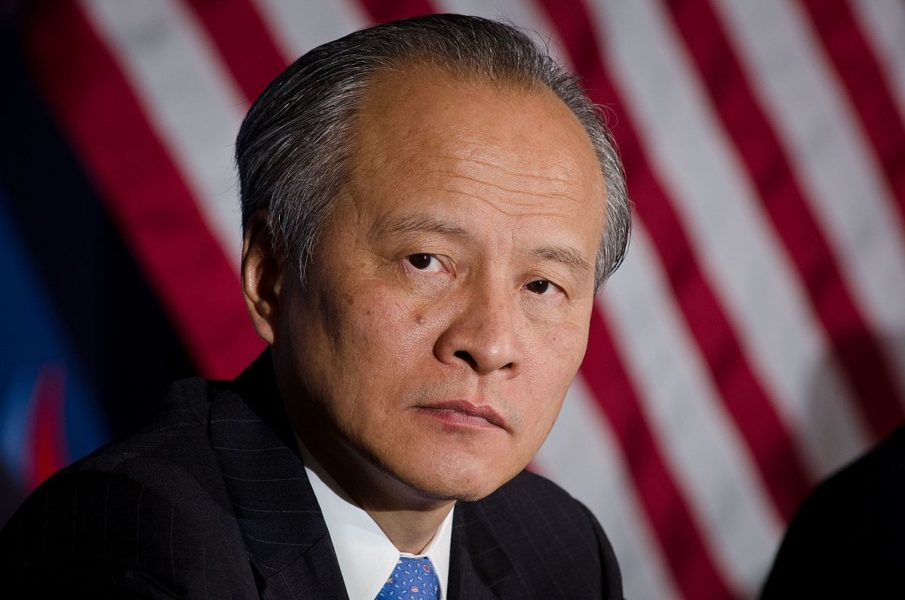As the two most formidable Pacific powers, one might argue that confrontation between the United States and China is inevitable, though throughout rising tensions, senior officials on both sides of the divide have continuously argued that degrading relations isn’t assured, and through diplomatic efforts, the growing military presence employed by each nation in the Pacific will never have to square off against one another. However, maintaining that balance is a challenge amid escalating concerns about Kim Jong Un’s North Korean regime, who counts China among his allies, and of course, China’s rapid and aggressive expansion throughout one of the world’s most heavily trafficked waterways, the South China Sea.
On Thursday, Chinese Ambassador to the United States, Cui Tiankai, addressed an international crowd that included U.S. Commerce Secretary Wilbur Ross and White House National Security Council senior director for Asian affairs Matt Pottinger as a part of a Lunar New Year celebration. During the event, he delivered some telling remarks directly to the United States, which though delivered in a friendly tone, seem to convey an increasingly aggressive posture.
When discussing the U.S., Cui began with a friendly overture, suggesting that the relationship between the two nations “should be characterized by overall cooperation. “Friendly competition, if competition is necessary, and no confrontation.”
We will continue to have differences between us, but our growing common interests are far more important. We may continue to have disagreements between us, but the need for cooperation will far outweigh any differences between us. We’ll continue to have problems, but dialogues will lead us to solutions.” He added.
The positive spin Cui placed on the disagreements between the U.S. and China could be called disingenuous, of course. The United States has expanded diplomatic and military relationships with a number of nations in the region, including former opponent Vietnam, thanks in large part to China’s aggressive behavior throughout the majority of the South China Sea. International law usually permits a nation exclusive ownership of waters within 12 nautical miles of their shores, though China’s claims over the waterway now extend all the way to foreign soil, claiming ownership of assets along the way.
Last year, China forced Vietnamese workers off of oil rigs, claiming ownership of the water formerly recognized as Vietnamese. That confrontation proved to be the final straw, as Vietnam agreed to increase “military cooperation” with the United States, including a visit from an aircraft carrier strike group, soon thereafter. China has also laid claim to islands and reefs that they’ve built into islands for the sake of expanding military emplacements throughout the region, drawing the ire of a number of other Asian nations, and pushing them toward alliances with the United States.
However, as Cui went on, the conflicts he described between China and the U.S. were not based on China’s territory grabs, military expansion, or extensive foreign influence campaigns. Instead, he blamed American paranoia.
It’s certainly paranoid to fear that a China that follows its own path of development would be confrontational to the United States. And it’s dangerous to advocate any strategy for confrontation,” he said.
Cui was likely referencing the recent move toward increasing what the American Navy calls Freedom of Navigation Operations (FONOP), in which U.S. Navy vessels travel through waters claimed by China as a symbol of America’s unwillingness to recognize the territorial claims U.S. officials characterize as illegal under international law.
It would be wishful thinking to believe that some political or cultural genetic engineering could be done to change China’s DNA.” He concluded.
These statements mirror similar ones made by U.S. Secretary of Defense James Mattis last June, though instead of blaming tensions on paranoia, he characterized them as a result of China’s disregard for international norms.
Already have an account? Sign In
Two ways to continue to read this article.
Subscribe
$1.99
every 4 weeks
- Unlimited access to all articles
- Support independent journalism
- Ad-free reading experience
Subscribe Now
Recurring Monthly. Cancel Anytime.










COMMENTS